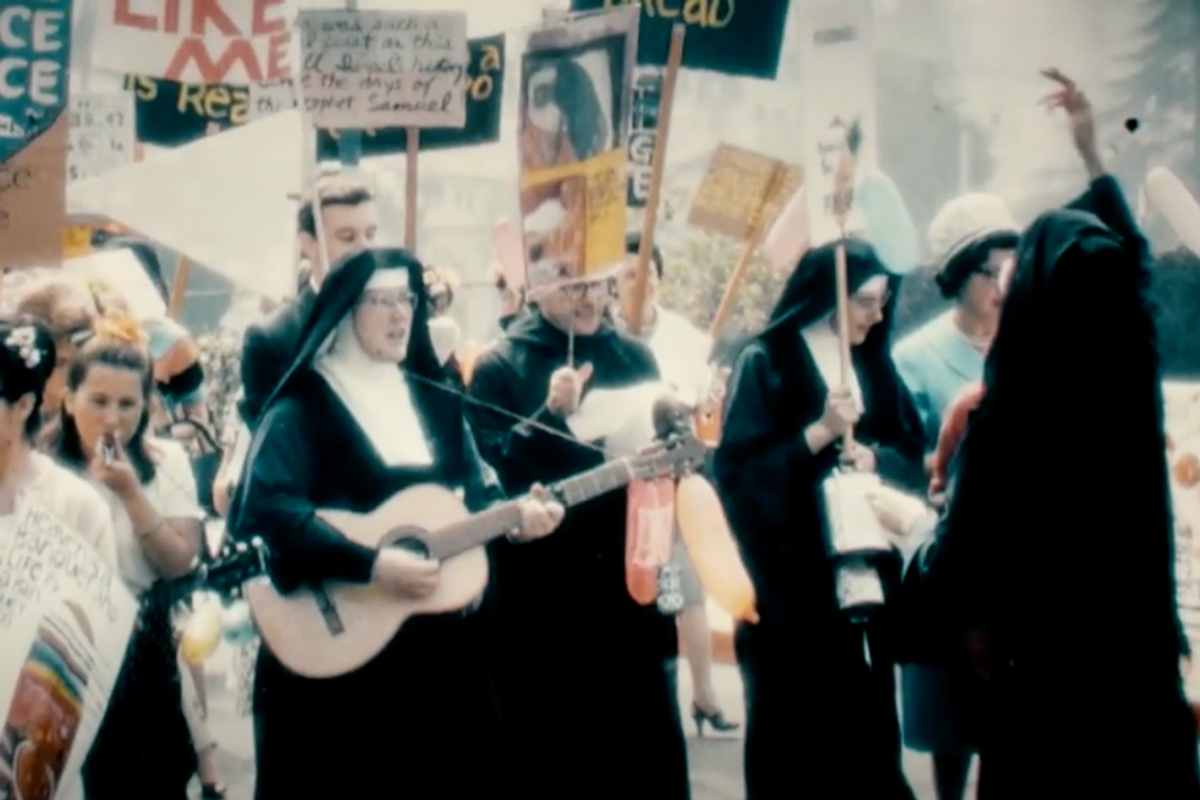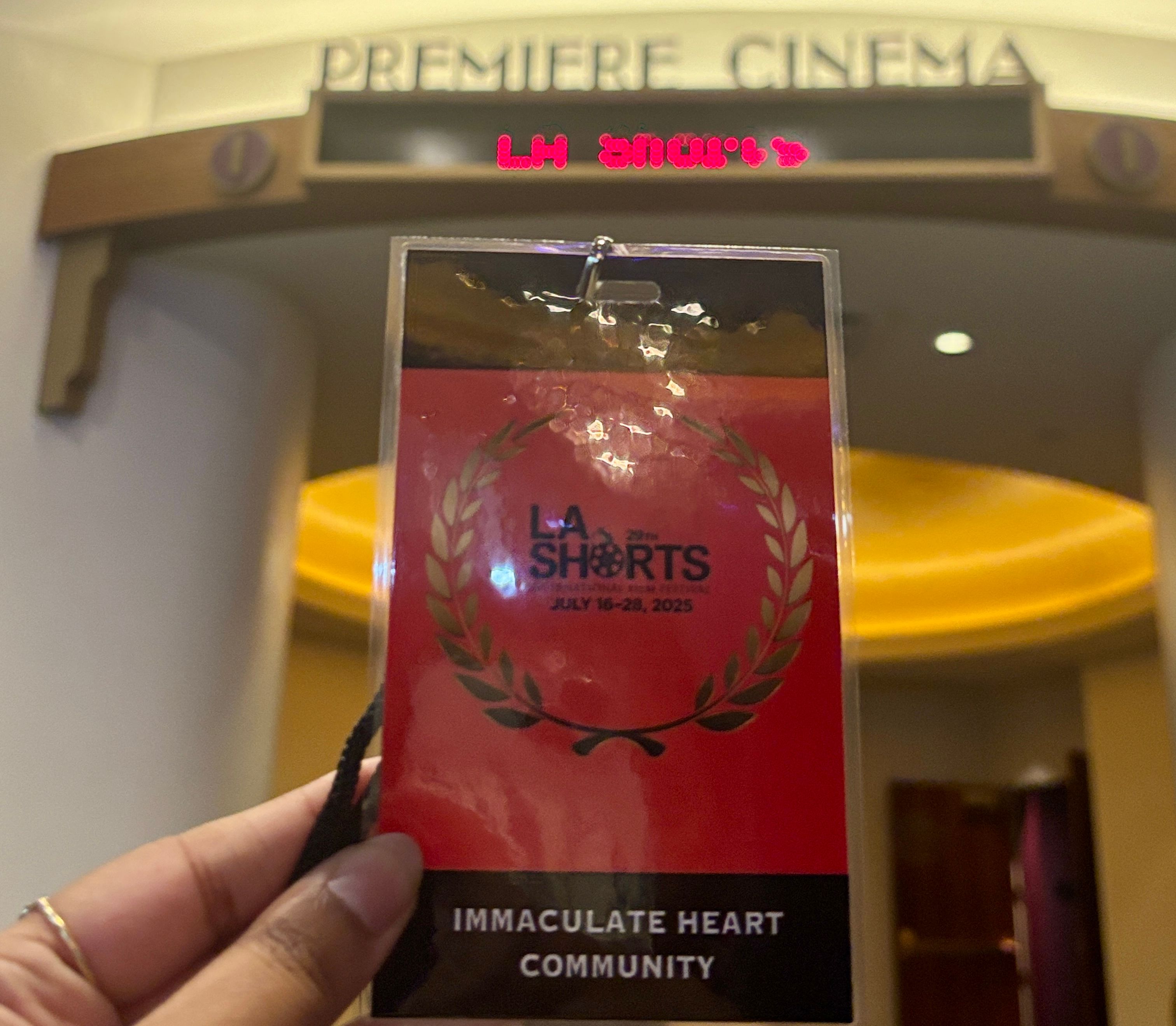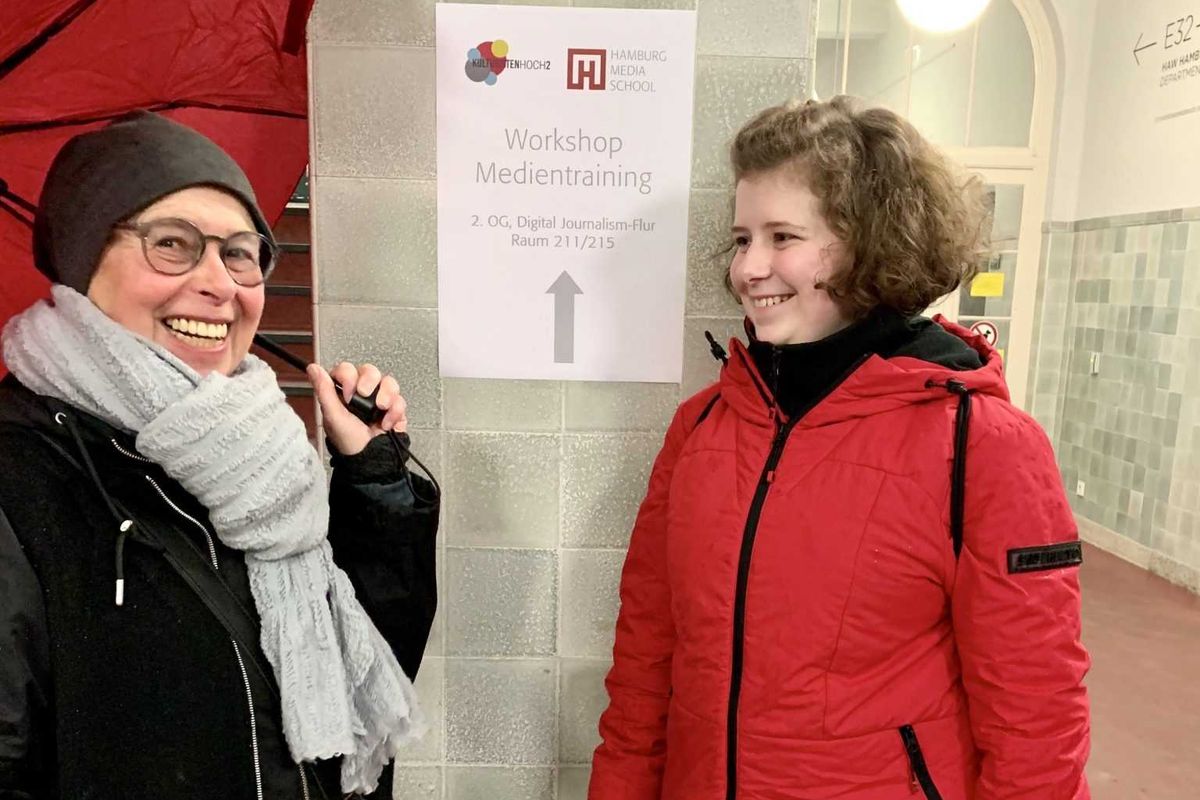How a group of 'badass' nuns became the heart and soul of a beloved Los Angeles film festival
"Film is the great connector."

Nuns from the The Sisters of the Immaculate Heart of Mary march in a 1960s protest
On July 16th, 2025, the 29th annual LA Shorts International Film Festival opened in Downtown Los Angeles at the Regal LA Live Theater. An Oscar- and BAFTA-qualifying event, opening night of the two week festival featured a red carpet, a slate of four acclaimed short films, and pulled in a crowd of over one thousand attendees.
Four hundred seventy films will be showcased between July 16-28, including only one feature film in the sea of shorts: Rebel Hearts, a 2021 documentary directed by Pedro Kos, screened for free on Saturday, July 19th.
The Rebel Hearts film website shares:
"In 1960s Los Angeles, a trailblazing group of nuns, The Sisters of the Immaculate Heart of Mary, bravely stood up to the patriarchy of the Catholic Church fighting for equality, their livelihoods, and their own freedom against an all-powerful Cardinal who sought to keep them in their place. Their bold acts of faith, defiance and activism turned the Church upside down, helping to reshape our society in ways that continue to resonate today. From marching in Selma in 1965 to the Women’s March in 2018, they challenged the notion of what a nun and a woman were supposed to be.
Anita Caspary, Helen Kelley, Pat Reif, and iconic pop artist Corita Kent were devoted to a life of service, not only to other but to themselves—forming a community that empowered each sister to live up to her fullest potential. Their desire to bring the church into modern life was met with forceful opposition at every turn. As each of them discovered their own talents and voices, they full stepped into their roles as leaders in a movement that is still making waves.
The Sisters of the Immaculate Heart of Mary became the Immaculate Heart Community (ICH), an inclusive ecumenical community based in Los Angeles that has sponsored opening night of the LA Shorts Film Festival for the last three years.
I attended both opening night and the July 19th screening of Rebel Hearts courtesy of IHC and was moved by the film that was artful, informative, and filled with grace as it followed the sisters who merely wanted two things: to serve Christ and to live their lives as their authentic selves.
"We may seem like strange bedfellows," said Sherry L. Purcell, IHM, Ph.D., president of Immaculate Heart Community, as she addressed the crowd on opening night. "What do a bunch of nuns have to do with a film festival?"
Today, however, Immaculate Heart is no longer a community of nuns. "We are a community without walls," says Purcell. One that welcomes women and men, gay, straight, and all LGBTQ, and all religions and faith practices to fight injustice against immigrants, the environment, women, BIPOC, and the unhoused. "We are anti-racist. We strive to strategically impede practices that disrupt human development. We are for diversity, equity, and inclusion," Purcell continued to warm applause.
Founded in 1997 by Robert Arentz, the LA Shorts International Film Festival is one of the largest, most prestigious, and longest-running short film festivals in the world. It's connection with IHC, however, began just a few years ago thanks to Pam Hope, Immaculate Heart's director of mission advancement. A longtime friend of Arentz, Hope told Upworthy she reached out to him in hopes of helping IHC become "more relevant" with young people in Los Angeles.
"Pam got us connected with the film festival my first year as president and I thought, 'Oh, this is kind of a leap,'" Purcell told Upworthy. "But then I could see it. I could see what we needed to do to open people's hearts through stories."

"On opening night they select and show justice films," Hope noted. "Films that speak to current issues and raise awareness for what's going on in the world and our community." This year, opening night featured four shorts:
- Como si la tierra se las hubiera tragado, an animated short on femicide and gender-based violence in Mexico directed by Natalia León that won the jury award at the Sundance Film Festival.
- The Letter, a documentary from German director Oliver Würffell that tells the story of his how his great-grandfather was executed by Nazis for refusing military service.
- Classroom 4, a documentary directed by Eden Wurmfield on the prison system that won Best Documentary at Aspen Shortsfest.
- Walud, a German-Syrian film directed by Daood Alabdulaa and Louise Zenker about Amuna, a woman whose husband, an ISIS fighter, takes a young second wife.
Rebel Hearts fits right in as it tells a story of fighting for social justice, human rights, and progressivism in spiritual communities.
Under the control of Cardinal McIntyre, who served as archbishop of Los Angeles from 1948 to 1970, the sisters were told when they could talk, when and how they could pray, and how they could dress. They were also used as free labor for the various grade schools Cardinal McIntyre holds a legacy for building across LA County, often forced to teach bloated classroom sizes with little to no training (save for the college degrees they worked on simultaneously to carry out their teaching jobs).
The film focuses heavily on four key women who also narrate the events through a series of interviews: the late Anita Caspary, Ph.D. (Sister Mary Humiliata), who was the Mother General of the Immaculate Heart of Mary Sisters, the late Helen Kelley, Ph.D., (Sister William), who was the president of Immaculate Heart College, the late Pat Reif, Ph.D., a professor at Immaculate Heart College, and the late Corita Kent (Sister Mary Corita), famed pop artist who began as a sister and educator and gained the most attention and pushback from the Cardinal.
Though righteous and progressive in the face of archaic tradition, the efforts of these women and hundreds of other sisters were met with extreme resistance from the powers in charge during the 1960s. In a 2021 review of the film, Variety noted that though some victories such as the "groundbreaking outcomes" of the Second Vatican Council (1962-1965) which "sought to modernize certain Church traditions for a 20th century public" were won, the film shows how their resistance ultimately led to some 300 sisters asking to be released from their vows, thus leading them to found the "secular" Immaculate Heart Community in 1970.
Fifty-five years later, the community is thriving with 40 original members. One member, 94-year old Lenore Dowling (who attended the festival's opening night and whom Hope dubs "a badass"), is just as active in the community as ever. She can be seen in the film's opening scene marching with sign in hand at the 2018 Women's March in Los Angeles and most recently demonstrated with other community members during a No Kings March in June 2025.
After the film screening, I sat down with Sherry L. Purcell, Pam Hope, and Mary Kirchen (a current member of the IHC who just missed joining the Sisters in the late 60s) to talk more about the community, the legacy of Rebel Hearts, and the future of Immaculate Heart Community.
Upworthy: Given today’s political climate, how do you see what IHC went through in the 60s and 70s in comparison to what we’re facing today, specifically in America?
Sherry L. Purcell: I’ve been president of the community for two and a half years and I really do feel that what they did, the work they did in the 1970s, was very prophetic for our times. We are a “community without walls.” We’re not nuns, we don’t live in convents, we’re inclusive—we have men, women, gay straight, everyone—and our faith-based practices are inclusive of everybody. We also have a very active justice and social justice orientation in our work, so we commission justice for women, for the environment, for immigrants and indigenous people, the unhoused. We even have a commission called 'Anti-racism and Spiritual Transformation,' so our members are very active in those movements and with other organizations doing similar work.
[In the film] Anita Caspary was asked, “What do you think the impact would be on the Roman Catholic Church what we’re doing? Is this going to be a problem further in the church? Her response was that this actually might be the solution to bring life back into the church, which is the way we see our “community without walls.” We are founded in Christianity, but we honor all faith traditions and much of the practices we do in our prayer life reflect that. In terms of today, there are a lot of people who have turned away from organized religion and are looking for spiritual life and growth in a community of believers and people. People are also oriented around social justice. That’s who we are and I think we have something to offer people. When we come together as a community, we come together with that commonality of love and wanting to do good in the world.
Mary Kirchen: There’s something that touched me when I was watching again: There're several snippets that stand out. (Helen) Kelley talked about “rocking the boat” and being in a boat that “desperately needed to be rocked.” It’s interesting because in church architecture, churches themselves are built like boats, and the word “ecumenism” has to do with that symbolism, and so we’re in a boat together, right? Just like Jesus was on a boat in Galilee…and so that symbolism was interesting because the boat needed to be rocked and the boat still needs to be rocked.
I think one of the boundaries is being rooted in Jesus. We talk about Christianity, but I think there’s a slight difference in being rooted in Jesus and what’s happening in Christianity right now. Corita was asked how she felt about what happened [to the Sisters], and she said she didn’t want to talk about it, but she was the one who asked [the Cardinal and the archdiocese], “What would Jesus do?” when the Sisters were being questioned and scrutinized. In our goal statement we talk about being rooted in Jesus and united with the people of God, and that's why. It's a relationship, not a religion.
Upworthy: [Sherry] referred to the IHC and the film festival as sort of “strange bedfellows” at opening night. You’ve sponsored opening night of the festival for the last three years, so do you feel this is a chance to connect with a more secular space and crowd without being overtly spiritual? How do you view the connections you’ve made and what do you hope to see from it?
Pam Hope: In the Immaculate Heart community, the values in the work are ever present. We want to reach out to people who aren’t affiliated or who don’t feel they have a spiritual home, and many have that yearning (for spiritual community) and art is a really great connector. The secular nature of this short film festival is actually a great place because a lot of the films have deeper meaning, speak to social justice and highlight that—and we have that in common.
Mary Kirchen: As a human being, I am in relationship with creation and I get to do that. And in a sense of thinking about that relationship, there’s something bigger...and I call that something God. The relationship here opens dialogues about our identities and who we are, makes way for deeper conversations. It’s an opening to an opportunity, and film is an opportunity.
Sherry L. Purcell: I think the creativity that comes through these films ultimately will have so much power to speak to the love we’re trying to bring forward. Look at Rebel Hearts…we couldn’t tell that story that same way if not through film, if not on the screen.
Mary Kirchen: It's the power of films. Film is the great connector. One of the gifts of having experienced change—because change is our partner—is to be a convener. Our relationship in the traditional education fashion has changed: we don’t have teachers in schools much anymore, but we create a different model and we’re still convening people and asking them, what is the root of why you’re coming together? Art and film allows us to do that.
Upworthy: Though the women of Rebel Hearts fought so hard for their rights, they still ended up leaving the Catholic church in the end. Some could look at that as a failure, but then this community came out of it, so was it a failure? Was it a victory?
Sherry L. Purcell: Well that speaks to the prophetic nature of the community. They were bucking the male hierarchy saying women can’t be involved, women have to essentially be enslaved in the church structure, and these women said, “Hell no! We’re going to do something different” and we’re still here 55 years later and we have something valuable to offer to people, to the world turning away from the traditional church. In fact, just last year, Nellie Scott, the director of the Corita Arts Center in the Arts District of downtown Los Angeles, called me and said the center had been invited to the Vatican and they wanted to do an exhibit of Corita’s art at the Venice Biennale. It was held in a women’s prison and they showed Corita’s artwork there and the imprisoned women were able to act as docents. Nellie got to meet Pope Francis, who recognized the power of Corita’s artwork...so even though [Corita's] gone, she's not really. She’s alive and kicking too.
Mary Kirchen: It's also about the importance of being joyful. Yes, there’s tough things happening, there are injustices people experience, and that causes confusion of spiritual identity: Why are we doing this? Why does it matter? If you don’t witness with integrity, why the hell are you doing it? At one point in the film, priests from the Vatican tell the Sisters to just pretend they're following the rules to avoid the wrath of Cardinal McIntyre, but not actually do what they say they're doing. But they had integrity. The decision was made, and every person who made that choice signed not only the document saying she wanted to be released from her vows, but the documents that claimed the identity of what was going to happen going forward. Unfortunately I didn’t get to sign that because I wasn’t a nun then, but I remember.
Pam Hope: I know so many other sisterhoods and religious groups point to us as being pioneers. Without Immaculate Heart, others said they would have “stayed in their habits,” stayed “cloistered,” and wouldn’t have had such a social justice bent. The impact has definitely been seen in modern religious activities, especially in the Catholic church.
Mary Kirchen: One of the affirming things is for us to understand how we are seen [by the world]. That’s what helps us. Again, it's a relationship with God and with God's people.
Sherry L. Purcell: The work we’re doing today stands on the shoulders of the women who formed the organization in the 70s. They were rebels and I think we aspire to be rebels.
- YouTube youtu.be
Today, Immaculate Heart Community still has many irons in the fire. They currently host a Lunch and Learn Lecture series that invites local leaders of social justice initiatives to their building in Echo Park to speak about issues and efforts for change in Los Angeles and beyond. They are also soon launching a "Power Up with Prayer" initiative that invites people of all faith traditions to pause at noon every day and pray for the country.
As for the LA Shorts International Film Festival, IHC plans to continue sponsoring the event's opening night and making connections within the industry. "Moving forward, we hope that our involvement with the film festival will be a year-long presence rather than a keystone moment of the festival itself," Hope noted.
"Last year, we gave awards to five short films that Bob [Arentz] flagged as really highlighting social justice," added Purcell. "This year, we want to do the same thing but expand it even after the festival. We're going to invite filmmakers who have received awards to join with us and talk about their films, showcase related films, and start a dialogue about the issues they tackle."
Learn more about becoming a friend of the Immaculate Heart Community on their website and Instagram, and stream Rebel Hearts on HBO Max.
- Women like her, who did what she did, are supposed to be ashamed. But she's saying 'no more.' ›
- 'Wicked' is becoming a political Rorschach test and so many people are missing the point ›
- 5 documentaries about women that will truly change the way you see the world. ›
- Three elderly nuns broke into their old convent and refuse to leave - Upworthy ›
- France’s rehabilitation program turns prisoners into farmers, equipping them with jobs and housing - Upworthy ›



 A UPS truck with package deliveries.Image via Wikipedia
A UPS truck with package deliveries.Image via Wikipedia
 Cher was the biggest phenomenon on the planet for the better part of the '70s and '80s.Casblanca Records/
Cher was the biggest phenomenon on the planet for the better part of the '70s and '80s.Casblanca Records/

 A high school volunteer with her senior "tandem."
A high school volunteer with her senior "tandem."  KH2 makes leaving the house more accessible to senior citizens.
KH2 makes leaving the house more accessible to senior citizens.  Many "culture buddies" stay in contact after the program ends.
Many "culture buddies" stay in contact after the program ends.  KH2 provides students with excellent life skills and lasting connections.
KH2 provides students with excellent life skills and lasting connections. 
 Parents posing with their young kids on a basketball court. via
Parents posing with their young kids on a basketball court. via